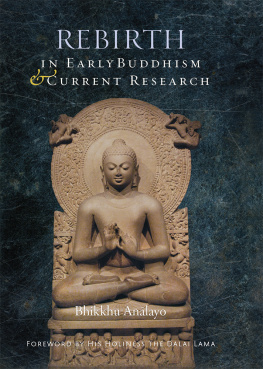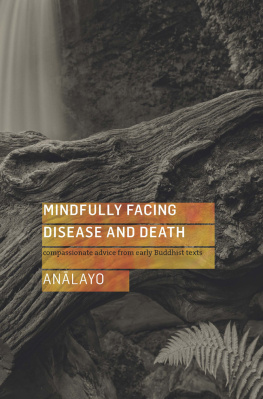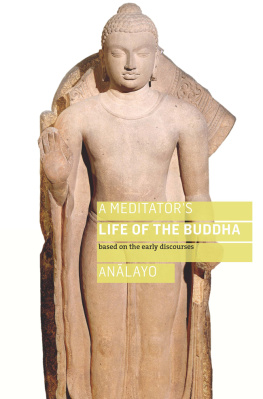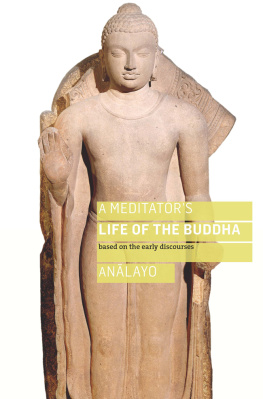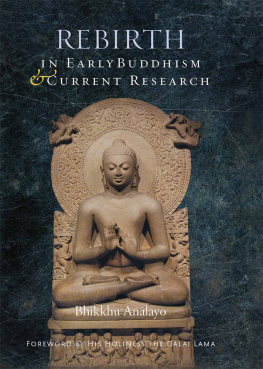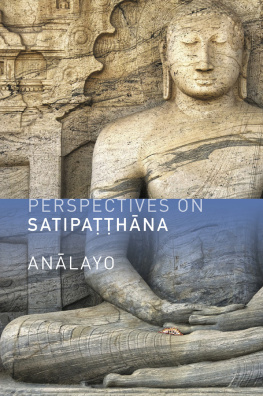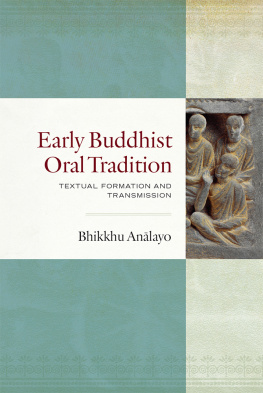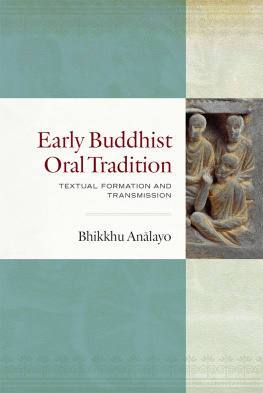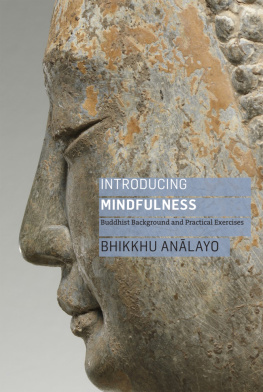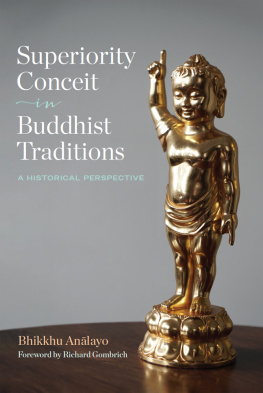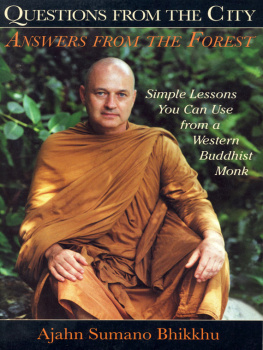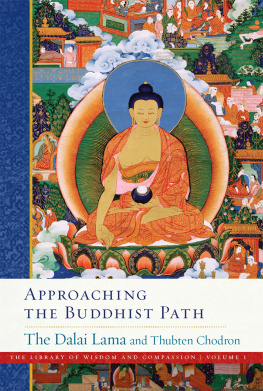
Wisdom Publications
199 Elm Street
Somerville, MA 02144 USA
wisdompubs.org
2018 Bhikkhu Anlayo
All rights reserved.
No part of this book may be reproduced in any form or by any means, electronic or mechanical, including photography, recording, or by any information storage and retrieval system or technologies now known or later developed, without permission in writing from the publisher.
Library of Congress Cataloging-in-Publication Data
Names: Anlayo, 1962 author.
Title: Rebirth in early Buddhism and current research / Anlayo.
Description: Somerville, MA: Wisdom Publications, 2018. | Includes bibliographical references and index. |
Identifiers: LCCN 2017037682 (print) | LCCN 2017041117 (ebook) | ISBN 9781614294627 (ebook) | ISBN 9781614294467 (hardcover)
Subjects: LCSH: ReincarnationBuddhism. | BISAC: RELIGION / Buddhism / History. | RELIGION / Buddhism / Rituals & Practice. | BODY, MIND & SPIRIT / Reincarnation.
Classification: LCC BQ4485 (ebook) | LCC BQ4485 .A53 2018 (print) | DDC 294.3/4237dc23
LC record available at https://lccn.loc.gov/2017037682
ISBN 978-1-61429-446-7 ebook ISBN 978-1-61429-462-7
22 21 20 19 18
5 4 3 2 1
Cover and interior design by Gopa & Ted2, Inc. Cover image courtesy of Eric R. and John C. Huntington, The Huntington Archive at The Ohio State University. The index was not compiled by the author.
As an act of Dhammadna, Anlayo has waived royalty payments for this book.
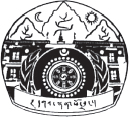
Foreword by His Holiness the Dalai Lama
I welcome the publication of this book examining the concept of rebirth, the idea accepted by most Buddhists that our lives have no beginning and that we move from one life to the next. Since Buddhists of all traditions accept that the scriptures preserved in Pli are the earliest record of what the Buddha taught, Bhikkhu Anlayos confirmation that rebirth is clearly explained there in the context of dependent arising and karma is valuable. He also highlights the commonly accepted accounts that recollection of his own previous lives and the lives of others had a vivid place in the Buddhas own experience of awakening.
Dignga, the great Indian logician of the fifthsixth century, examined the idea of rebirth extensively. He pointed out that when we talk about material things, we have to consider substantial causes and cooperative conditions. Our physical bodies, for example, are composed of particles. Each particle has a substantial cause, and we could theoretically trace these back to the Big Bang and even beyond that. Therefore we conclude that the particles that make up the material world have no beginning.
Just as there are no beginnings on a physical level, consciousness, too, is without a beginning. Dignga argued that the substantial cause of consciousness must be of the same nature as consciousness. He asserted that, while matter can provide cooperative conditions in terms of our sense organs, brain, and nervous system, matter cannot be the substantial cause of consciousness. The substantial cause of consciousness must be of the same nature as consciousness. In other words, each moment of consciousness is preceded by an earlier moment of consciousness; therefore we say that consciousness has no beginningand it is on that basis that we describe the theory of rebirth.
I share Bhikkhu Anlayos goal of trying to understand things as they really are, so I am happy to see that he reviews here debates about rebirth before looking at other evidence. In discussions I have been holding with modern scientists for more than thirty years, I have noticed a shift from their earlier assumption that consciousness was no more than a function of the brain to an acknowledgment of neuroplasticity, and recognition that the relationship between mind and brain may be more interdependent than they thought. I have also asked whether, when a perfect sperm meets a perfect ovum in a perfect womb, the conception of a conscious being will automatically occur. Scientists concede that it will not but are unable to explain why. Buddhist science explains that the additional factor to consider is the presence of consciousness.
Bhikkhu Anlayo draws attention to reports of children who remember previous lives. I have come across several such children myself. In the early 1980s I met a couple of girls, one from Patiala and another from Kanpur in lndia, who had very clear memories of their past lives. They clearly and convincingly recognized their former parents, as well as where they had lived in their previous lives. More recently, I met a boy who was born in Lhasa, Tibet. Insisting that his birthplace was not his home, he urged his parents to take him to India. First they brought him to Dharamsala, where I live, but he continued to insist, This is not where Im from; my place is in South India. Eventually he led his parents to Gaden Monastery, found his previous house, and pointed out his former room. When they went in, he said, If you look in this box youll find my glasses, which indeed they did.
A similar story relates to the grandson of a Tibetan friend living in America. I recognized the boy as the reincarnation of a lama my friend had known. However, the boys father did not want his son to be recognized and brought up as a reincarnate lama and sent him to school instead. The grandfather told me that eventually the boy spoke up of his own accord, saying, This is not where Im supposed to be. I should be in India at Drepung Loseling Monastery. In the end, the father accepted the situation and allowed him to join the monastery.
My mother used to tell me that when I was young I had clear memories of my past life. These faded as I got older, and now I cant even remember what happened yesterday. When I recently met the young boy who came from Lhasa to join his monastery, I asked him if he still remembered his past life, and he told me he did not. I was glad to know I am not the only one whose previous-life recollections have vanished.
The case Bhikkhu Anlayo cites, of a young boy able to recite Pli from a bygone era that he is unlikely to have encountered in any other way, also corresponds to my experience. I have heard about people who can recite texts and verses that they have not knowingly memorized, and of course there are many who can memorize texts with unaccountable ease, as if they already knew them. That they have knowledge from previous lives seems an appropriate explanation. Such things happen, but so far science has no explanation for what is going on. However, I know several scientists who are interested in looking into this.
I agree with Bhikkhu Anlayo that the purpose of the exploration presented in these pages is not to impose a particular point of view, but to provide the opportunity for better understanding based on analysis and discussion. Many people predict that the twenty-first century will be a time when we really come to understand the way the brain works. If this is true, it will necessarily be a time when we develop a better understanding of the workings of the mind, too. I believe that such circumstances will throw light on the question of rebirth. Science may yet discover convincing evidence that rebirth is impossible. In the meantime, I recommend that interested readers take the Buddhas advice when he urged the monks who followed him to examine and investigate what he had said as a goldsmith tests gold by heating, cutting, and rubbing it. Read the evidence here, think about it, weigh it against your own experience, and make up your own minds.
Next page
